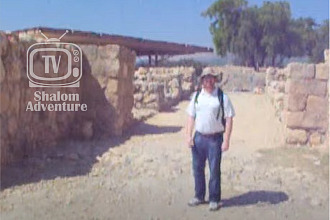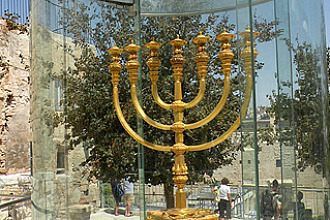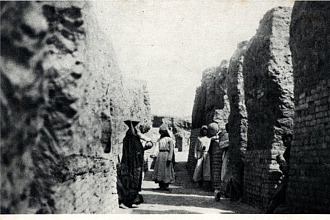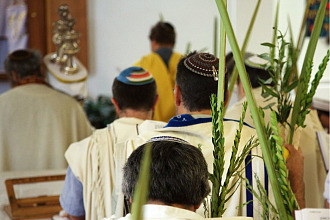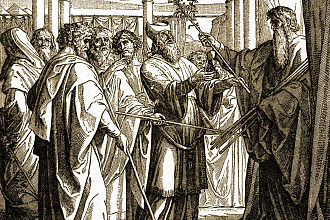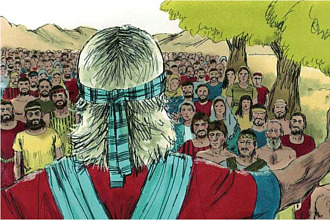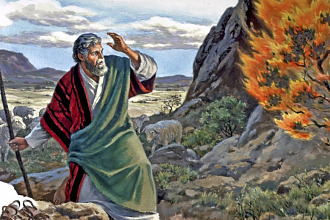Parasha for the week: Yitro, Exodus 18:1 -20:23
Haftara for the week: Isaiah 6:1-13
Overview
This is the Torah portion containing the giving of the Ten Commandments.
Moses' father-in-law, Jethro (Yitro in Hebrew) joins the Jewish people in the desert, advises Moses on the best way to serve and judge the people -- by appointing a hierarchy of intermediaries -- and then returns home to Madian.
The Ten Commandments are given.
The portion concludes with the Almighty telling Moses to instruct the Jewish people not to make any images of God. They were then commanded to make an earthen altar; and eventually to make a stone altar, but without the use of a sword or metal tool.
"Jethro's Advice"
Jethro advises Moses on the best way to serve Israel. To organize small group leaders.
Ex. 18:17-21 Moses' father-in-law replied, "What you are doing is not good. You and these people who come to you will only wear yourselves out. The work is too heavy for you; you cannot handle it alone. Listen now to me and I will give you some advice, and may God be with you. You must be the people's representative before God and bring their disputes to him. Teach them the decrees and laws, and show them the way to live and the duties they are to perform. But select capable men from all the people — men who fear God, trustworthy men who hate dishonest gain — and appoint them as officials over thousands, hundreds, fifties and tens.
How many leaders were appointed in Israel:
According to the Bible 600,000 men between 20 and 60 besides women and children left Egypt (Exodus 12:37)
According to specialists if we account all the people (men, wowen, children, old people) they were between 2.5 millions to 3 millions.
If we have a people of 2.5 millions we need
250,000 leaders of 10
50,000 leaders of 50
25,000 leaders of 100
2,500 leaders of 1,000
Plus the Elder board or Sanhedrin = 70 people
Plus the prince of each tribe = 13 (Joseph was divided in two tribes (Ephraim and Manasse)
327,583 leaders, that is the minimum figure.
"Keep my Covenant"
According to Rabbi Zelig Pliskin The Torah states, "And now if you will certainly listen to My voice and observe My covenant, you will be to Me a treasure from all peoples for Mine is the entire world. And you will be to Me a kingdom of Cohanim (priests) and a holy nation" (Exodus 19:5). How is it possible for us to rise to this level?
Rashi, the great commentator, cites the Mechilta on this verse that "All beginnings are difficult." When one tries to accomplish for Torah, he might be discouraged when he finds himself running into difficulties and go from enthusiastic to disillusioned. He might tell himself, "Things are so difficult that I'll never accomplish. I'll never get anywhere even if I do try, so I might as well give up right now."
If you ever feel this way, remember that all beginnings are difficult. Expect difficulties when you commence doing something and you won't be discouraged by them. The only way to consistently meet your goals is by being persistent.
Regardless of how difficult you find it at first, as long as you consider your original goal worthwhile, keep on trying. That is the only way anyone succeeds. Very frequently, the difficulties are short-lived, and as you persevere you will find things becoming easier and easier.
"The First Commandment"
According to Rabbi Yaakov Menken, obviously, the existence of God is the first and most fundamental principle of traditional biblical belief. Maimonides begins his Halachic Encyclopedia, the Mishneh Torah, with "The foundation of foundations and pillar of all wisdom is to know that there exists a First Being, and He brought into existence all that exists..." Maimonides also lists this as the first Positive Commandment in his Sefer HaMitzvos (Book of Commandments). The Sefer HaChinuch says that "the roots of this commandment need no explanation - it is known and revealed to all that this is the foundation of religious belief."
The commandment to know of God's existence is thus not merely a religious value, but a moral obligation -- that which compels moral behavior even when it is difficult. "These are the things which Hashem commanded you, that you shall do them..." [35:1]
"Value of the Commandments and the Shabbat"
Giving the Torah was a one-time event. Yet, God has commanded us to remember it each day. For spiritually, the Giving of the Torah applies every day of our lives; as our sages tell us, "Each day the Torah shall be in your eyes as new!"
* Our sages state that the mitzvah of observing Shabbat is equivalent to all other mitzvot of the Torah and one who observes Shabbat is as if he or she fulfilled the entire Torah.
"One Mind and One Heart"
The parasha tells how the Jewish people prepared to receive the Torah as follows: "In the third month of the departure of the children of Israel from the land of Egypt, on that day, they came to the desert of Sinai. They had journeyed from Rephidim and had come to the desert of Sinai and they camped in the desert." Then the Torah adds, "And He [Israel] camped there opposite the mountain."
Why does the Torah refer to the Jewish nation in the plural ("And they camped in the desert,") yet when the Jewish nation came to Mount Sinai, the Torah uses the singular, "And he [Israel] camped there opposite the mountain?"
According to our sages, when the Jewish people came to Mount Sinai to receive the Torah there was great unity among them, as never before; "they were as one person with one heart." This is why the Torah uses the singular ("he") to describe the entire congregation.
How did camping at Mount Sinai cause them to be united "as one?"
The answer can be found when we understand why God chose to give the Torah on Mount Sinai, one of the lowest of the mountains, rather than on a mountain that was taller and more distinguished. Our sages reply that God wanted to teach the Jewish people that Torah is acquired and internalized only through humility.
This is one reason the Torah is compared to water. Just as water will always flow to the lower level, so too Torah is found with those who are humble.
Strife and intolerance among people is caused by selfishness and haughtiness. When the Jewish people came to Mount Sinai and realized why this mountain was chosen for the giving of the Torah, they too practiced humility! Humility is the key to unity!
The Rabbi of Koshnitz would say, "If all of Israel would join hands together in unity they would blend into one big hand which would reach all the way to the Heavenly Throne!"
"Story"
The fourth commandment of the Ten Commandments which we read in this week's Parsha, Yitro, is the mitzvah of observing Shabbat: "Remember ("Zachor") the Shabbat day, to keep it holy. Six days you shall labor and do all your work. But the seventh day is a Shabbat unto the Lord your God, in it you shall not do any work, you, nor your son, nor your daughter, nor your man-servant, nor your maid-servant, nor your cattle, nor the stranger that is within your gates. For in six days the L-rd made heaven and earth, the sea and all that is in them and rested on the seventh day. Therefore the Lord blessed the Shabbat day and made it holy."
From the Midrash: Before giving of the Torah God called the Jewish people and said to them, "My children, I have a great treasure, which I
will give to you if you accept the Torah and observe the mitzvot."
The Jewish people asked, "What is the treasure You are going to give us if we observe the Torah?"
God replied, "It is the reward in the World-to-Come."
The Jewish people said, "Master of the Universe, show us a sample of the World-to-Come."
God responded, "I will give you the holy day of Shabbat which is 1/60th of the World-to-Come."
Shabbat Shalom, have nice and successful day
Amram Elofer


